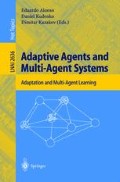Abstract
We control a population of interacting software agents. The agents have a strategy, and receive a payoff for executing that strategy. Unsuccessful agents become extinct. We investigate the repercussions of maintaining a diversity of agents. There is often no economic rationale for this. If maintaining diversity is to be successful, i.e. without lowering too much the payoff for the non-endangered strategies, it has to go on forever, because the non-endangered strategies still get a good payoff, so that they continue to thrive, and continue to endanger the endangered strategies. This is not sustainable if the number of endangered ones is of the same order as the number of non-endangered ones. We also discuss niches, islands. Finally, we combine learning as adaptation of individual agents with learning via selection in a population.
Access this chapter
Tax calculation will be finalised at checkout
Purchases are for personal use only
Preview
Unable to display preview. Download preview PDF.
References
Gary S. Becker. Altruism, egoism, and genetic fitness: Economics and sociobiology. In The Economic Approach to Human Behavior, pages 282–294. University of Chicago Press, Chicago, 1976.
T. Borgers and R. Sarin. Learning through reinforcement and replicator dynamics. Journal of Economic Theory, 77:1–14, 1997.
Andrea Cavagna, Juan P. Garrahan, Irene Giardina, and David Sherrington. Thermal model for adaptive competition in a market. Physical Review Letters, 83:4429–4432, 1999.
Philippe De Wilde. Neural Network Models, second expanded edition. Springer Verlag, London, 1997.
Philippe De Wilde. How soft games can be played. In H.-J. Zimmermann, editor, EUFIT’ 99, 7th European Congress on Intelligent Techniques & Soft Computing, pages FSD-6-12698, Aachen, September 1999. Verlag Mainz.
Philippe De Wilde, Hyacinth S. Nwana, and Lyndon C. Lee. Stability, fairness and scalability of multi-agent systems. International Journal of Knowledge-Based Intelligent Engineering Systems, 3(2):84–91, 1999.
Drew Fudenberg and David K. Levine. The Theory of Learning in Games. MIT Press, Cambridge, Massachusetts, 1998.
B. A. Huberman, editor. The Ecology of Computation. North-Holland, Amsterdam, 1988.
Nicholas J. Jennings. On agent-based software engineering. Artificial Intelligence, 117:277–296, 2000.
John Pezzey. Economic analysis of sustainable growth and sustainable development. World Bank, Washington DC, 1989.
Andy Purvis and Andy Hector. Getting the measure of biodiversity. Nature, 405:212–219, 20.
John Maynard Smith. Evolutionary Genetics. Oxford University Press, Oxford, 1998.
S. M. Stanley. Macroevolution. W. H. Freeman, San Fransisco, 1979.
Jörgen W. Weibull. Evolutionary Game Theory. MIT Press, Cambridge, Massachusetts, 1995.
Author information
Authors and Affiliations
Editor information
Editors and Affiliations
Rights and permissions
Copyright information
© 2003 Springer-Verlag Berlin Heidelberg
About this paper
Cite this paper
De Wilde, P. et al. (2003). Adapting Populations of Agents. In: Alonso, E., Kudenko, D., Kazakov, D. (eds) Adaptive Agents and Multi-Agent Systems. AAMAS AAMAS 2002 2001. Lecture Notes in Computer Science(), vol 2636. Springer, Berlin, Heidelberg. https://doi.org/10.1007/3-540-44826-8_7
Download citation
DOI: https://doi.org/10.1007/3-540-44826-8_7
Published:
Publisher Name: Springer, Berlin, Heidelberg
Print ISBN: 978-3-540-40068-4
Online ISBN: 978-3-540-44826-6
eBook Packages: Springer Book Archive

